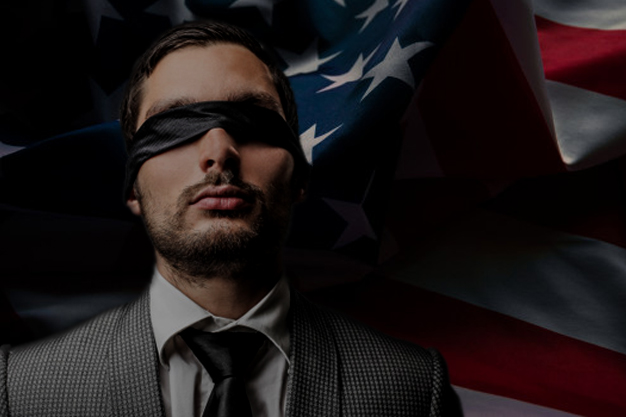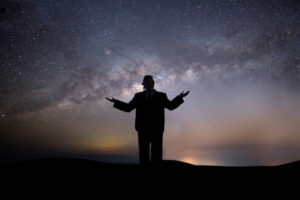
The United States has long held itself in high regard in the public light, claiming to exist as an emblem of democracy and a beacon of hope for oppressed people around the world. The U.S.A., as its leaders have consistently told outsiders and its own constituency, is the moral centerpiece of the global community. Since the ego of the United States runs as deep as its cutthroat capitalist roots, generations of citizens have received the same messages from their governors, senators, and presidents: that the United States in its engagements abroad are simply carrying out moral obligations. Among the people receiving these messages are two bodies of people that make up a divided populace: those who seek the truth, and those who don’t.
The Truth Seekers
The façade that the oppressors in government use to blind its people is a carefully knitted veil of nationalist rhetoric and deceit. Some citizens, however, are globally savvy enough to think critically about what they’re being told and what is actually happening.
It doesn’t take a Ph.D. to conclude that the Monroe Doctrine has historically been invoked to falsely justify U.S. aggression in Latin America and the Caribbean. The United States claims that it is the defender of liberty and holds democracy as its fundamental governing moral, yet a democratically elected President Allende in Chile is assassinated at the hands of the Central Intelligence Agency. More recently, democratically elected Manuel Zelaya of Honduras was ousted in a military coup d’état supported by the U.S. Secretary of State at the time, Hillary Clinton. Critical thinkers look these acts and ask themselves: how can a nation declare “In the name of democracy” and then act in direct opposition to democratic elections in other nations?
Another favorite tag of United States’ foreign policy is humanitarian intervention, or the “defense of freedom.” These claims have backed a controversial engagement in Vietnam as well as military involvement in the Middle East that has led the region to deteriorate into a power vacuum from which has sprung ISIS. Why has the U.S. had no presence elsewhere in the world where humanitarian tragedies have been the norm for generations? Africa, perhaps? The truth seekers see past the cloak presented to the people during the State of the Union Address and in the corporate media; it is not moral obligation that governs the United States’ involvement elsewhere. It is self-interest. The Middle East has a vast reserve of oil – the largest in the world, and the U.S. uses its military force to make sure it has a hand in how things play out in this strategically selected unstable region.
The Blind
Unfortunately, there are many people in the United States who believe the rhetoric of their corrupt leaders. In fact, there are many who support the malicious policies and legislations designed and implemented by their own government to exploit foreign land and people. Why is it so easy for the United States’ governing body to convince its citizens to believe such rhetorical fallacies about its benevolent global presence? The answer might be that the citizenry of the United States simply are not well educated about the world and its goings on. Few adults in the United States have studied global history past the compulsory high school curriculum, and those textbooks are thoroughly whitewashed and riddled with Eurocentric content. Even those who do try to keep themselves up-to-date on world events and U.S. involvement abroad find it very hard to find unbiased sources in the midst of busy lives. Their sources of information are likely one of the 90% of U.S. media that is ultimately owned by only six gigantic corporations, as Business Insider reports. One of those corporations is General Electric. What interest does an energy conglomerate have in managing mass media that includes news coverage of U.S. foreign policy? The truth seekers might begin think, while the blind simply accept.
Beyond television and the media, many of the blind in the U.S. simply have no real-life frame of reference. They don’t know anything other than the customs and worldviews with which they’ve grown up. The U.S. State Department reports that there are approximately 126 million valid U.S. passports in circulation; that’s less than 40% of the United States’ total population. You can’t leave the country if you don’t have a passport. Perhaps this is an indication of why the status quo in U.S foreign policy persists: because a majority of people in the United States couldn’t enrich their perspectives firsthand even if they so desired, and then those same constituents go and cast their ballots from inside their safe bubbles.
Isolationist Country vs. Isolationist People
The United States, in fact, is anything but an isolationist country. The U.S. military and political presence spans the entire planet, engaging frequently in places to which they were never invited. They are the U.S. people who are isolationist. While the powers that represent their nation are out pulling strings, making deals, and barking orders to the international community, the majority of U.S. citizens can’t step across the border out into the world itself. It is this dangerous dichotomy that has allowed the belligerent and corrupt forces of the United States to convince its isolated people that they are acting as the world police, maintaining peace and order throughout a chaotic and frightening planet. Unfortunately, many still believe such nonsense. Some don’t, but it will not be until the people of the United States begin to seek truth that their government will change and the reign of lies will come to an end.



